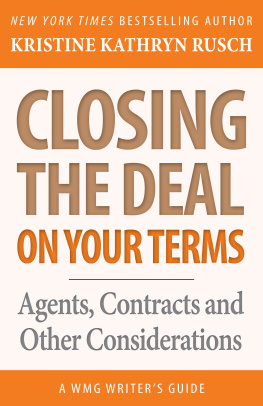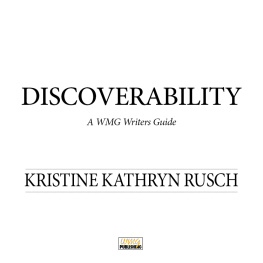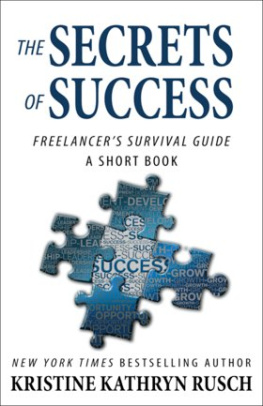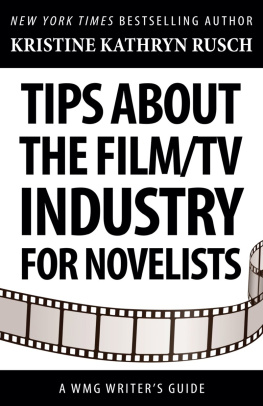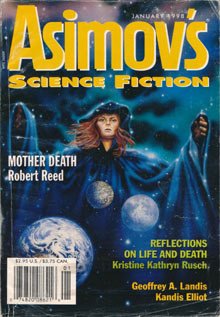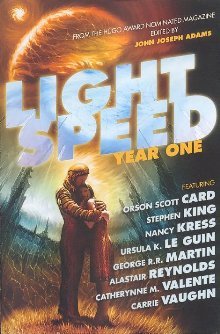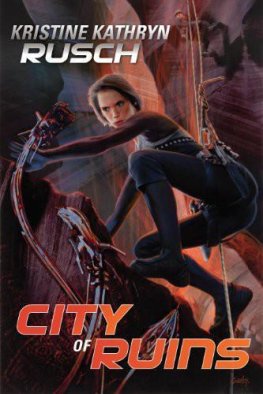Kristine Kathryn Rusch - Closing the Deal on Your Terms
Here you can read online Kristine Kathryn Rusch - Closing the Deal on Your Terms full text of the book (entire story) in english for free. Download pdf and epub, get meaning, cover and reviews about this ebook. year: 2016, publisher: WMG Publishing, Inc., genre: Romance novel. Description of the work, (preface) as well as reviews are available. Best literature library LitArk.com created for fans of good reading and offers a wide selection of genres:
Romance novel
Science fiction
Adventure
Detective
Science
History
Home and family
Prose
Art
Politics
Computer
Non-fiction
Religion
Business
Children
Humor
Choose a favorite category and find really read worthwhile books. Enjoy immersion in the world of imagination, feel the emotions of the characters or learn something new for yourself, make an fascinating discovery.
- Book:Closing the Deal on Your Terms
- Author:
- Publisher:WMG Publishing, Inc.
- Genre:
- Year:2016
- Rating:5 / 5
- Favourites:Add to favourites
- Your mark:
- 100
- 1
- 2
- 3
- 4
- 5
Closing the Deal on Your Terms: summary, description and annotation
We offer to read an annotation, description, summary or preface (depends on what the author of the book "Closing the Deal on Your Terms" wrote himself). If you haven't found the necessary information about the book — write in the comments, we will try to find it.
Kristine Kathryn Rusch: author's other books
Who wrote Closing the Deal on Your Terms? Find out the surname, the name of the author of the book and a list of all author's works by series.
Closing the Deal on Your Terms — read online for free the complete book (whole text) full work
Below is the text of the book, divided by pages. System saving the place of the last page read, allows you to conveniently read the book "Closing the Deal on Your Terms" online for free, without having to search again every time where you left off. Put a bookmark, and you can go to the page where you finished reading at any time.
Font size:
Interval:
Bookmark:

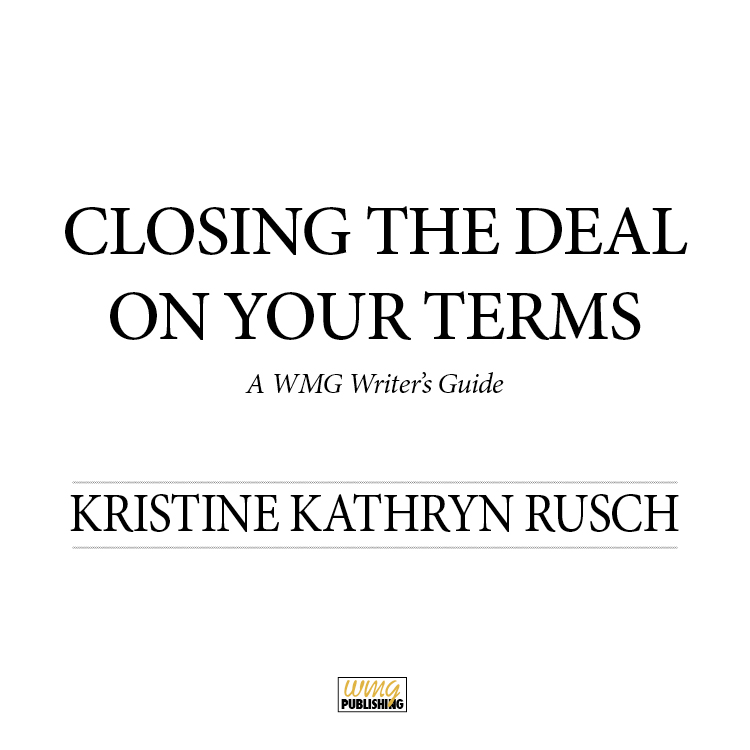
ACKNOWLEDGMENTS
I owe a huge debt of gratitude to my weekly blog readers. Many of them donated money to keep me writing. A large number quietly sent me contracts so I could see many of the things Ive discussed in this book. Even more sent me links to various articles online, some of which Ive linked to here. Many corrected me on my misunderstanding of the law, and Ive tried to incorporate that in here. All mistakes, however, are 100% mine.
I cant name most of the people whove helped me, because they did so on condition of anonymity, but I know who you are, and I thank you.
I can thank Helen Sedwick, whose excellent book helped me organize my thoughts, David Vandagriff (the Passive Guy), Roxie Munro, and Nate Hoffelder.
I especially owe Teri Kanefield for her contributions to the Non-Compete section. Shes been lovely and gracious to work with. Shes an amazing writer, and I couldnt have done that section without her.
Contents
A Real Contract
Recommended Books
FOREWORD
In 2012 and 2013, I published a series of blogs on contract deal breakers for traditionally published writers. Those blogs became a book called Dealbreakers. Ive been promising to update it for years now, but Ill be honest: The very topic discourages me.
Still, I have come to the point where I cant ignore the contractual changes in the industry any longer. With the help of my readers, I spent over four months exploring the state of contracts in the publishing industry. I examined everything I could find, from terms of service to existing contracts. I discovered some pretty slimy contract terms, masquerading as good contracts. I learned that agent agreements have proliferated, to the detriment of the writer. I learned that publishers are now interpreting seemingly out-of-date clauses in a brand-new, and somewhat frightening, way. I learned that some online services for writers have rights grabs buried in the Terms of Service.
I could have continued writing blog after blog about the things I discovered for the next four months, maybe even for the next four years. I finally quit, not because I had run out of things to say, but because I had run out of the will to continue.
Even so, the book you hold in your hands is five times longer than the original Dealbreakers book. This book covers much more than the original book did, and with a different perspective.
Because, in the intervening years, the industry changed dramatically. As the industry changed, so did my opinion about everything from hiring an agent to whether or not a traditional book publishing deal is a good idea. If you compare the old Dealbreakers to this volume, you will thinkat timesthat they were written by two different writers.
They were. One writer is older and wiser.
The point of this entire book is to help writers and others make informed decisions about the contracts they sign and the deals they make. I may disagree with your final choice, but I will defend it to the deathas long as your choice is an informed choice.
Your career is different from mine. Your needs are different. And your desires are different. You might sign something I would never touch or you might find me too lenient. Thats all well and good, as long as you make the best choice you can at the time you make it.
And as long as you continue learning and growing.
That has been the most fascinating part about this process for me. Im still learning, each and every day. Im discovering new things. Some of them are things I wished I hadnt seen. Others make some bad decisions in my past even clearer. And still others show me just how different 2016 is from the publishing world I first entered, decades ago.
This book has several loosely defined sections. You can dip in and out of the book if you would like, but it is meant to be read as a whole.
I do have both types of readers in mind. Ill do my best to point out when you need to read a previous chapter to understand the current one. And Ill also repeat a few things in some chapters, so that the people who dip in and out can follow.
I doubt Ill write another version of this book. To be frank, the experience of going through these contracts, and seeing how theyve been weaponized against writers, left me very discouraged. Many of you have written to me to help me through some of the darker weeks, and I greatly appreciate that.
I appreciate all of the interaction. This book would not exist without the input from the blog readers, industry professionals, and a few of my lawyer friends behind the scenes. Also, many of you helped by sending donations to keep me writing when the going got tough. Thank you .
And now, onto the heart of the project.
I do hope that the information inside this book helps you make the right decisions for yourself and your career.
Kristine Kathryn Rusch
Lincoln City, Oregon
October 7, 2016
INTRODUCTION
At some point, all writers will make a publishing deal. Whether that deal is with a large traditional publishing company or with a short story house, with a gaming company or a foreign publisher, the writer will have to sign a contract. And the writer needs to understand that contract.
Writers are often desperate to get published. Or, in this modern age filled with easy self-publishing, writers want the legitimacy of an agent and a traditional book deal. Once writers have experience in traditional publishing and realize that its not about legitimacy, but its about business, those writers might choose to leave. Many of them, however, will do what Im doing: Theyll self-publish some things and publish others traditionally.
Theres even a term for us now. Were called hybrid writers.
The bugaboo is the contract. The bugaboo is always the contract. Traditional publishing houses used to have relatively fair contracts. They dont any longer. If the writer handles a negotiation with a traditional publisher as if shes working with friends, shes making a very serious mistake.
In fact, any writer who lets her agent negotiate for her without having an intellectual properties attorney first vet the contract is also making a mistake. Traditional publishing contracts have gotten so complicated that agents (who have no legal training) can no longer handle the fine legal details with any degree of competency.
Traditional publishing houses have teams of attorneys developing their contracts. Writers need a team on their side to negotiate the contract.
The main reason is this: Traditional publishers have gone from wanting only the rights they need to demanding as many rights as they can get, not just for the book under consideration, but for all books the writer writes. If the writer wants to remain a hybrid writeror even if she wants to leave and go to a different traditional publisherthen she must negotiate a good contract for herself.
I know that the idea of negotiating scares writers. I wrote an entire book on negotiation for the timid, called How to Negotiate Anything. There is a short course on negotiation toward the end of this book. But if youre truly having trouble, pick up the original book.
I have learned through the course of this series that writers are terrified to hire an attorney to handle their work. I have included a chapter on attorneys at the end of this book. I hope it provides the first step in dispelling the myths about attorneys that so many writers hold.
Before I get much deeper into this chapter, let me make one point very clear: I am not a lawyer . Nothing in this book should be construed as legal advice. I do my best to research everything, but I can be (and sometimes am) wrong.
Font size:
Interval:
Bookmark:
Similar books «Closing the Deal on Your Terms»
Look at similar books to Closing the Deal on Your Terms. We have selected literature similar in name and meaning in the hope of providing readers with more options to find new, interesting, not yet read works.
Discussion, reviews of the book Closing the Deal on Your Terms and just readers' own opinions. Leave your comments, write what you think about the work, its meaning or the main characters. Specify what exactly you liked and what you didn't like, and why you think so.

